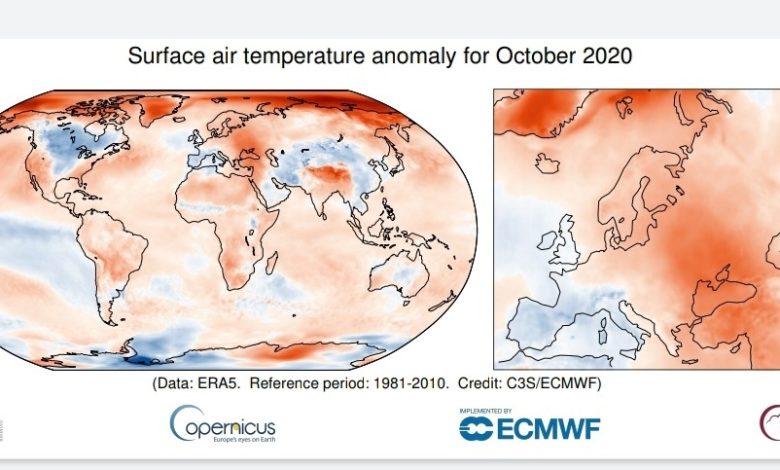Europe Records Warmest October, Third Warmest In History

October 2020 was the third warmest month on record globally and the warmest October in Europe, with above-average temperatures in the east, but below average in the southwest, a new report reveals.
Copernicus Climate Change Service in its new report reveals that in the Arctic, sea ice extent was the lowest for October since satellite measurements began in 1979 while in the Antarctic, levels were above-average extent for the second month in a row, after 48 months of below-average extent, the report reveals.
It stated that the six warmest Octobers have all occurred in the last six years.
According to the report, the European Union’s Earth Observation Programme temperatures were much above the 1981-2010 average in most of the Arctic and over the Tibetan Plateau.
In contrast, it was cooler than average over the eastern Pacific, large parts of inland North America and around the Tibetan Plateau to the north.
“October was warmer over central, eastern and northern Europe in 2020 than in the 1981-2010 average for the month,” the report said.
“Temperatures were considerably higher than average over countries bordering and north of the Black Sea, and over Svalbard and Franz Josef Land in the far north. It was distinctly cooler than average over southern Europe from Italy and the Alps westward.”
“Temperatures were extremely high for October over many of continental land areas and islands north of the Arctic Circle.
It further indicated that temperatures were also extremely high over the Arctic Ocean and it’s bordering coastal seas, particularly in a region extending eastward from Svalbard over the seas north of Siberia to the Beaufort Sea north of Alaska and northwestern Canada.
“Temperatures were also very much higher than average over the Tibetan Plateau and around the eastern Mediterranean Sea.”
The European agency report for October added that temperatures over the western United States continued to be much above average.
Heatwave conditions continued in Paraguay, Bolivia and southern Brazil, and were experienced in Namibia and other countries in southern Africa. Much of the rest of Africa also had above-average temperatures.
“Temperatures were well below average over the central USA and southern Canada during October. It was also relatively cold in an arc surrounding Tibet, to the west, north and east.”
“Conditions were colder than average over a substantial part of Antarctica, especially over the Ronne Ice Shelf, but substantially warmer than average over a large part of East Antarctica, and also relatively warm over the Ross Ice Shelf.”
The report showed that air temperatures remained relatively high over the north-eastern Pacific Ocean and over the ocean east of Nova Scotia and east of Japan. Marine air temperatures elsewhere were largely above the 1981-2010 average, but relatively cool temperatures continued to extend westward over the tropical Pacific as La Niña conditions continued to develop, says Copernicus.
“ Temperatures over the extratropical oceans of the Southern Hemisphere were cooler than average in several places. It was also slightly cooler than average over relatively small oceanic areas west of Ireland and north-west of Hawaii.”
Averaging over twelve-month periods smooths out shorter-term variations in regional- and global average temperatures. Globally, the twelve-month period from November 2019 to October 2020 was 0.64°C warmer than the 1981-2010 average.
The value for this period is a little below than that of the 12-month periods ending in May 2020 and September 2016, the two warmest periods in this record.
“2016 is the warmest calendar year on record, with a global temperature 0.63°C above that for 1981-2010. 2019 is the second warmest calendar year in this data record, with a temperature 0.59°C above average.”
Support Our Journalism
There are millions of ordinary people affected by conflict in Africa whose stories are missing in the mainstream media. HumAngle is determined to tell those challenging and under-reported stories, hoping that the people impacted by these conflicts will find the safety and security they deserve.
To ensure that we continue to provide public service coverage, we have a small favour to ask you. We want you to be part of our journalistic endeavour by contributing a token to us.
Your donation will further promote a robust, free, and independent media.
Donate HereStay Closer To The Stories That Matter




